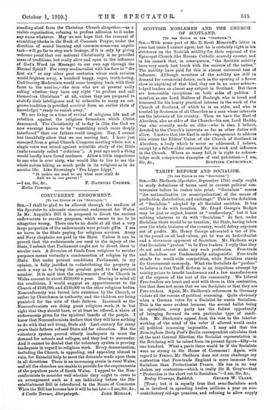SCOTTISH NOBLEMEN AND THE CHURCH OF SCOTLAND.
[To THE EDITOR OP THII "ErscrAroa."]
Sin,—With some part of Mr. D. Scott Moncrieff's letter in your last issue I cannot agree, but he is certainly right in his strictures on the Scottish nobility for their espousal of the Episcopal Church (the Roman Catholic scarcely counts), and in his remark that, in consequence, "the Scottish nobility have very much lost touch with the marrow of the nation." The nobility have paid for this in almost universal loss of influence. Although members of the nobility are still in demand for ceremonial duties, such as the opening of a flower show or anything of that kind, they are in no sense acknow- ledged leaders on almost any subject in Scotland. But there are honourable exceptions on both sides of politics. I mention as one Lord Balfour of Burleigh, who is loved and honoured for his hearty practical interest in the work of the Church of Scotland, of which he is an elder, and who is trusted by Scotsmen of all Churches as a man whose interests are the interests of his country. Then we have the Earl of Aberdeen, also an elder of the Church—his son, Lord Haddo, was also recently made an elder—who is also, I believe, devoted to the Church's interests so far as other duties will allow. I notice that the Earl is under engagement to address this winter the Elders' Union of the Church of Scotland in Aberdeen, a body which is never so addressed, I believe, except by a fellow-elder esteemed for bie work and influence in the Church. Where so many fail, it is right to acknow- ledge such conspicuous examples of real patriotism.—I am,


























































 Previous page
Previous page